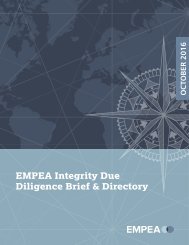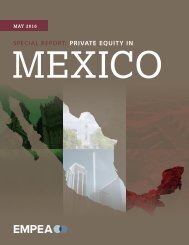You also want an ePaper? Increase the reach of your titles
YUMPU automatically turns print PDFs into web optimized ePapers that Google loves.
amined the impact that venture capitalists have on their<br />
portfolio companies and found that geographic proximity<br />
(more specifically, travel time) affects value creation. To do<br />
so, the authors considered how the introduction <strong>of</strong> new airline<br />
routes that reduced travel time between venture capitalists<br />
and their portfolio companies affected portfolio companies<br />
with respect to the quantity and quality <strong>of</strong> their innovations<br />
and success (i.e., exits via IPO or acquisition). The authors<br />
found that reductions in monitoring costs stemming from<br />
these new airline routes indeed translated into better<br />
portfolio company performance. The authors hypothesized<br />
that such success could be attributed to more time spent by<br />
the venture capitalists at the portfolio companies where they<br />
could advise executives, provide access to key resources,<br />
and aid the operation’s pr<strong>of</strong>essionalization. 12 While this<br />
study exclusively examined VC activity in the United States,<br />
it <strong>of</strong>fers a persuasive argument for the impact <strong>of</strong> proximity<br />
in this context.<br />
Further supporting the impact <strong>of</strong> location on company<br />
oversight, Josh Lerner found that venture capitalists<br />
typically served on the boards <strong>of</strong> geographically proximate<br />
companies. In particular, Lerner found that more than half <strong>of</strong><br />
the biotechnology firms he examined had a venture director<br />
with an <strong>of</strong>fice within 60 miles from their headquarters, and<br />
the distance was within seven miles for a quarter <strong>of</strong> the<br />
companies. In other words, the data suggested that the cost<br />
<strong>of</strong> oversight is sensitive to the distance between the PE firm<br />
and its portfolio companies. 13<br />
Practitioner Perspectives<br />
In frontier markets, and Africa specifically, a local presence<br />
may be even more significant, given, for example, weak or<br />
nonexistent internet connections and expensive travel. In<br />
fact, a 2014 survey <strong>of</strong> 106 global limited partners by the<br />
Emerging Market Private Equity Association (EMPEA)<br />
found that 55% <strong>of</strong> respondents felt that a “limited number<br />
<strong>of</strong> established fund managers” would likely deter SSA PE<br />
investment within the next two years. 14<br />
What is it specifically that gives an advantage to local firms?<br />
We consider two such factors below, deal access and due<br />
diligence. Particularly in emerging markets where PE firms<br />
have not differentiated by brand, a local presence is critical<br />
for both deal access and deal assessment.<br />
• Deal access<br />
David Wilton, then <strong>of</strong> the International Finance Corporation<br />
(IFC), emphasised that access to deal flow, especially<br />
proprietary deal flow, requires local contacts. 15 The United<br />
Nations Economic Commission for Africa also noted that<br />
deal flow is mainly generated by “personal networks <strong>of</strong><br />
fund managers,” and just one-third <strong>of</strong> deals are generated<br />
through company / sector tracking. 16<br />
• Due diligence and reputation checking<br />
The British Private Equity & Venture <strong>Capital</strong> Association<br />
(BVCA) has detailed a variety <strong>of</strong> challenges impeding<br />
private equity due diligence in SSA. 17 These included the<br />
need to understand the business and political connections<br />
<strong>of</strong> company founders, and the difficulty <strong>of</strong> finding executive<br />
talent, all in the face <strong>of</strong> limited public information. The stakes<br />
are high: missteps can leave the PE firm (even if it has a<br />
minority position) vulnerable to anti-corruption legislation.<br />
In addition, regional and country-specific political risk also<br />
complicates the already risky business <strong>of</strong> investing in SMEs.<br />
Uncertain <strong>of</strong>ficial economic information in frontier markets<br />
also complicates the process <strong>of</strong> deal assessment. Without<br />
reliable estimates <strong>of</strong>, for instance, economic sector activity,<br />
market size numbers could be inaccurate and “sector<br />
picking” strategies could be futile. 18 As a result, success in<br />
frontier markets appears to dictate that a PE firm establish<br />
at least a local <strong>of</strong>fice in a country <strong>of</strong> interest.<br />
To dig a little deeper into the PE firm and portfolio<br />
company benefits <strong>of</strong> “localised” private equity, we <strong>of</strong>fer a<br />
brief description <strong>of</strong> Blackstone’s minority investment in a<br />
local Brazilian PE firm, Pátria Investimentos. Blackstone’s<br />
investment in Pátria illustrates a broader trend <strong>of</strong> Western<br />
fund managers becoming “local” through partnership with<br />
established local players. 19<br />
3.2. The Importance <strong>of</strong> a Local Presence<br />
– Mini Case: Blackstone and Pátria<br />
Investimentos<br />
The value <strong>of</strong> subtle local knowledge for PE is clearly illustrated<br />
in Blackstone Group’s partnership with Brazil-based Pátria<br />
Investimentos. On October 1, 2010, the Blackstone Group<br />
invested US$200 million for 40% equity in Pátria, a local<br />
Brazil-focussed alternative asset manager founded in 1988<br />
with one <strong>of</strong> the strongest records in Latin America. 20 The<br />
Pátria investment was part <strong>of</strong> Blackstone’s broader emerging<br />
<strong>Conduits</strong> <strong>of</strong> <strong>Capital</strong> – Onshore Financial Centres and Their Relevance to African Private Equity<br />
| 53





